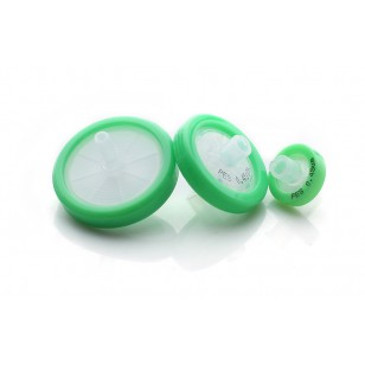The syringe filters are used for removing the particles and microorganisms from liquids or gases. They are available in different pore sizes and diameters. Mostly, these filters vary in terms of membrane materials. The selection of membrane differs according to the application. In biotechnological industries looking for filtration of peptides and enzymes, PES filters are widely demanded.

What Are PES Filters?
PES is the acronym for Polyethersulfone which is a hydrophilic polymer used for the manufacturing of PES syringe filters. These filters are mostly used for various chemical purification processes. They maintain highest levels of sample purity. Hence, they are widely preferred for preparation of samples for biotechnological companies.
Features and Applications of PES Filters:
These filters are primarily used for ion chromatography filtration of proteins solutions, tissue culture media, nucleic acids, and tissue culture additives. They are available as sterile or non-sterile filters. Also, they have a male Luer-slip outlet and a female Luer-Lock inlet for effective filtration of lab samples in pharmaceutical or biotechnology companies. PES syringe filters are certified DNase-free and RNase-free.
Benefits of PES Filters:
These efficient filters possess a wide array of features and absolute efficiency for various filtration methods. They are preferred mainly for the advantages like:
High-Speed Filtration:
The Polyethersulfone filters have a rapid speed of filtration for removing the contaminant particles found in a sample. This faster filtration method ensures lesser time taken for the complete procedure. Hence, it results in better efficiency and cost-effective purification of the laboratory samples.
Transparent Membrane:
This filter has a completely transparent membrane. Thus, it becomes easier to identify the particles filtered from the sample used. This testing can be effectively done with PES filters.
Chemically Inert:
The PES filters are chemically inert. It implies that these filters can be used for purification of a wide range of fluids without any risk to the sample. It does not contaminate any type of sample fluids or gases. Hence, it proves specifically beneficial for the samples that need to be purified before they are sent to a lab for further testing or study.
Low Rates of Protein Binding:
These filters have the lowest rates of protein binding. When the sample is less bound, its fluidity increases and it has better diffusion properties as well. The samples purified by PES filters can produce a better result by enduring the slight alteration in properties associated with its density.
Lastly, PES syringe filters are non-pyrogenic resulting in a better retention of properties even at high temperatures.


